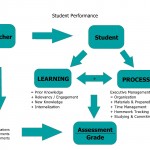 Procrastination is a disconnect between the NOW and the LATER. Overcoming the urge to procrastinate requires reconnecting with our own future. “Time Travel” can help bridge the NOW and the LATER.
Procrastination is a disconnect between the NOW and the LATER. Overcoming the urge to procrastinate requires reconnecting with our own future. “Time Travel” can help bridge the NOW and the LATER.
In Time Travel part 1: Ben Franklin & Managing the Now old Ben gave us some great advice on the consequences of delay. Ben was an incredibly productive man whose pursuits and accomplishments spanned science, literature, politics, and business. Good for him.
But how can we mortals get a little piece of Ben in our lives? Continue reading




 A student’s mom is upset about her grades and that she’s not doing her homework. But the student thinks her mom is being too pushy. Like high school teens & parents everywhere, they’re both a little right — and also a little wrong.
A student’s mom is upset about her grades and that she’s not doing her homework. But the student thinks her mom is being too pushy. Like high school teens & parents everywhere, they’re both a little right — and also a little wrong.
 For successful testing, students need to know what will be on the test. Sounds obvious, but parents don’t want to hear from their teens that there were “surprises” on a test or that they studied for the wrong thing.
For successful testing, students need to know what will be on the test. Sounds obvious, but parents don’t want to hear from their teens that there were “surprises” on a test or that they studied for the wrong thing.
 Meet a student & her mom.
Meet a student & her mom.




